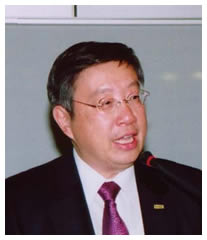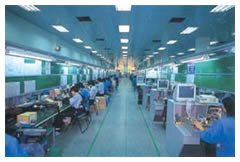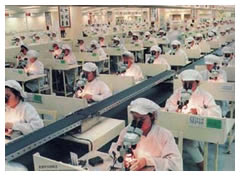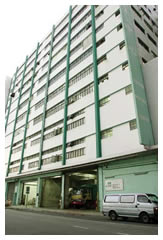Should "emigrated" industries return to Hong Kong?
In May 2002, I joined a delegation to
Editor's note: Hong Kong's current sluggish economy has prompted government officials and community leaders to suggest that local manufacturers with investment in the mainland should "move back" to Hong Kong to create more jobs and give the economy a much-needed boost. On 3 September, Dr Bill Chan, Deputy President of the Hong Kong Electronics Industry Association, spoke on this topic at the launch of the Distinguished Industrialists Lectures, organized by the Faculty of Science and Engineering. Dr Chan discussed the opportunities and challenges facing Hong Kong manufacturers who might consider moving their operations back from north of the border. Below is an abstract of his presentation.
Although the state of Hong Kong's economy is not desperate, the government and the community at large have lost their sense of direction: the economy has slowed down, the unemployment rate remains alarmingly high, and a huge budget deficit hangs over our heads. People have generally lost their confidence in the future... It's high time we revved up our brains and came up with solutions to these problems.There have been suggestions recently that local manufacturers and businessmen who have invested in the mainland should "return and build" Hong Kong. But this involves a decision on business investment and should first be dealt with from a macro perspective. At present, the international political situation is in a state of flux. The Middle East is a potential powder keg; the world economy is sputtering and stalling; the US economic recovery is weak; Japan is still mired in a prolonged recession; and Europe is facing a bleak business outlook. Under these circumstances, the overall business environment leaves much to be desired: high risks, low marginal profits, and bank loans are difficult to come by. Yet, if we look at the Asia-Pacific region, the situation may not be that bad. The twin locomotives powering Asian economic growth-China and South Korea-are expected to have an 8% and 4.3% growth in GDP, respectively, in 2003.
China's competitive strengths
The deteriorating business environment in the peripheral areas have made China a magnet of investments from Japan, Taiwan, the US and Europe. Investors have flocked to China to set up factories and supply chains or to access its huge market. China, especially in its southern region, enjoys enormous competitive advantages. I have dubbed these strengths as "from zero to nine": zero defects, where production quality has matched world standards; zero inventories, with great achievements in logistics management; one-stop supply of accessories and components, with quick delivery; 24/7 operations 365 days a year, making full use of machinery; and an efficient transport and telecommunications network. The nine advantages are: low wages; abundant supply of labour; ample supply of land; cheap factory premises; low cost of living; cheap raw materials; great flexibility; quick responses; and fast delivery. In addition, China has a society that emphasizes industry and manufacturing, unlike Hong Kong, which over the past 10 years or so has been distracted by speculative activities. Hong Kong manufacturers and industrialists receive in China the kind of respect and good treatment that they never did in Hong Kong.Since 1979, when China implemented an open door economic policy, Hong Kong manufacturers and industrialists have been streaming north to invest and set up factories. Today, in Guangdong alone, some 40,000 Hong Kong investors have set up shop, employing several million local labourers and fast becoming a mainstay in the local economy. To try to lure these Hong Kong manufacturers and investors to return to Hong Kong is a daunting task.
China has a population of 1.3 billion, with enormous market potential. The country has huge potential for further business growth. Since joining the World Trade Organization, it needs to integrate better with the international business world in the areas of legal, customs and taxation systems. To the Hong Kong manufacturers and businessmen who are experienced and well-connected in both the Chinese and international markets, new business opportunities are everywhere. It is difficult to expect them to give up their investment in China.
However, China is still a semi-open society, and the system contains imperfections that cause a lot of inconvenience to Hong Kong businessmen. Its legal system is still developing and local governments often come up with their own interpretations of the law. Customs procedures are cumbersome; the local currency, the Renminbi, is still not convertible; the mindset and culture of the people are still different from those in Hong Kong; and significant hidden business costs arise from the dependence on social connections, or guanxi, and personal favours.So, as an investor, what should I decide: stay in China or return to Hong Kong? I think, first, one has to consider the question of efficiency and results. From a practical point of view, a large-scale "re-emigration" programme is out of the question. Those labour-intensive and equipment-intensive manufacturers can hardly resettle in Hong Kong. In the past 10 years or so, Hong Kong's manufacturing base has been "hollowed out", resulting in a lost generation of industrial managers. And many of those who went to work in the mainland have permanently settled there. The mainland government, in a bid to safeguard its own interests, will surely roll out a range of preferential and concessionary policies to keep Hong Kong investors and businessmen there. The relocation of large factories, moreover, is rife with problems.
Relocate high-tech procedures to Hong Kong
What is feasible is the strategic relocation of selective manufacturing procedures back toSo, if we are willing to use our brains, it is not difficult to see that new business opportunities can arise from weaknesses in the existing systems. Hong Kong businessmen should make use of China's still evolving tariff and legal systems to develop new ideas and projects to service China's industry. This is not empty talk. I know of a steel plate manufacturer who, on finding out about the high customs tariff and inefficient methods of producing steel in China, went on to develop a new project, to help fill his customers' needs.
And the fact that overseas investors are falling over one another in rushing to invest in China should be another good opportunity for Hong Kong businessmen to play the role of middleman and match-maker. Hong Kong, as a gateway of foreign investments into China, is blessed with the following strengths: a well-equipped infrastructure; a healthy legal and tax system; an honest and clean government; its businessmen's good understanding of the international and mainland business environment; enterprises that are known for their ethical business practices; and it is a banking and financing centre as well as an arbitration centre. Overseas investors, with Hong Kong business partners as the bridge into China, can save themselves a lot of time and trouble in opening up China's market.
As far as the Hong Kong government is concerned, it could take some initiatives, such as setting up an industrial zone at the border to encourage new projects, new investments and new ideas to take root there, instead of letting old projects move in and out all the time. Now is also an appropriate time for the government to rethink its industrial policies, to strike a better balance in the economy, away from the previous emphases on finance and real estate. The industry community should give up its short-sighted practices of the past and adopt long-term development strategies. They should invest in machinery and production lines, in innovative technologies and on raising output quality: only by doing this will there be a future for Hong Kong's industry.
We should use the discussion on whether it is time for Hong Kong industry to move back to stimulate our imagination. We can think about how to respond to the government's call and at the same time make greater contributions to China's economic growth.



